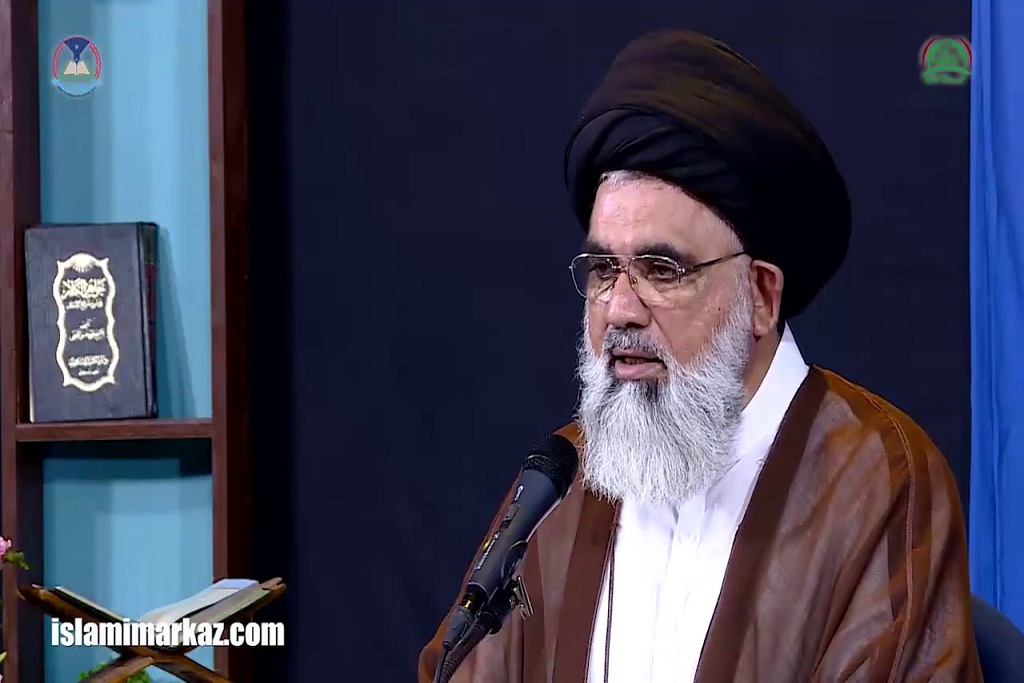Hujjatul Islam Ustad Syed Jawad Naqvi
(Principal Jamia Orwatul Wuthqa – Lahore)
Delivered at: Masjid Baitul ul Ateeq
Lahore – Pakistan
Friday Sermon – 29th November 2024
Sermon 1: Taqwa with friends, relatives who misguide from right path
Sermon 2: How Pakistani’s can stop oppression on Gaza in one day?
Taqwa holds significant importance when interacting with other individuals, as these relationships are both essential and routine. We view Shaitan as a formidable entity capable of influencing human beings in ways that contradict the principles of monotheism, wherein Allah seeks to guide humanity, yet has created a being so powerful that it obstructs this guidance. However, this perspective on Shaitan is flawed. There are two interpretations regarding Shaitan.
The first interpretation posits that he was Iblees, a Jinn who initially worshipped Allah but later rebelled against Adam, which led to his subsequent empowerment. Followers of Shaitan argue that worshipping Allah will not grant one all-encompassing power, while worshipping Shaitan allegedly bestows such power. This has given rise to a form of Satanism, characterized by specific symbols, such as metallic ornaments worn on various parts of the body, distinctive clothing styles that have become fashionable among youth, and outrageous hairstyles that serve as their identifiers. The ancient Zoroastrians believed in two deities: Yazdan, who created good, and Arhiman, who embodied all that is evil and malevolent. One deity creates goodness, while the other generates evil.
The second interpretation of Shaitan posits that he represents an internal state within humans. The word “Shaitanat” refers to someone who creates distance. Shaitan is associated with humanity and primarily serves to lead individuals away from the right path, direction, thought, and all that constitutes human flourishing. One of my efforts is to make our community aware that we often follow the actions of others while dismissing our own experiences. We are often the greatest deniers of our true selves. What we personally witness is deemed insignificant in comparison to the “truth” we have heard from our elders. This is a misunderstanding. We have strayed from the correct path in numerous aspects, including worship, religion, and revolution, only to realize it later. We can often identify who has led us astray. For instance, an uncle might question a father’s decision to send his child to a madrassa, thereby influencing that decision. Many students have attended this madrassa but later left; who was responsible for their departure? Was it Jinns? You are well aware of who dissuaded me from attending the madrassa—your friends, relatives, and colleagues who divert you from the right path are the true Shaitan. Those who you perceive as leading you astray are Shaitan, not just the Jinn from stories.
Taqwa serves as a protective shield in situations where one is besieged by groups of Shaitan attempting to dissuade and demotivate. In Surah Anam, Verses 70 and 71, Allah emphasizes the importance of Taqwa to safeguard ourselves from friends, neighbors, and fellow citizens. People from distant cities or those far away cannot misguide us. The Shaitan of Lahore resides within Lahore, and you are connected to him. Those who are not within your sphere cannot mislead you. For example, while Modi may be considered an evil individual, he cannot mislead us in Pakistan. The threats that endanger us are present in our immediate surroundings, and we must protect ourselves from such individuals.
قُلْ أَنَدْعُو مِنْ دُونِ اللَّهِ مَا لَا يَنْفَعُنَا وَلَا يَضُرُّنَا وَنُرَدُّ عَلَىٰ أَعْقَابِنَا بَعْدَ إِذْ هَدَانَا اللَّهُ كَالَّذِي اسْتَهْوَتْهُ الشَّيَاطِينُ فِي الْأَرْضِ حَيْرَانَ لَهُ أَصْحَابٌ يَدْعُونَهُ إِلَى الْهُدَى ائْتِنَا ۗ قُلْ إِنَّ هُدَى اللَّهِ هُوَ الْهُدَىٰ ۖ وَأُمِرْنَا لِنُسْلِمَ لِرَبِّ الْعَالَمِينَ {71}
Say: Shall we call on that besides Allah, which does not benefit us nor harm us, and shall we be returned on our heels after Allah has guided us, like him whom the Shaitans have made to fall down perplexed in the earth? He has companions who call him to the right way, (saying): Come to us. Say: Surely the guidance of Allah, that is the (true) guidance, and we are commanded that we should submit to the Lord of the worlds.
وَأَنْ أَقِيمُوا الصَّلَاةَ وَاتَّقُوهُ ۚ وَهُوَ الَّذِي إِلَيْهِ تُحْشَرُونَ {72}
And that you should keep up prayer and be careful of (your duty to) Him; and He it is to Whom you shall be gathered.
In today’s modern world, there are individuals esteemed in the fields of science and technology—professors teaching advanced subjects at universities—who paradoxically bow before stone idols they have carved themselves. These stones lack the ability to harm or benefit anyone, yet they are worshipped as deities, with devotees seeking worldly desires from them. This phenomenon is observed among various cultures, including the Japanese, Koreans, ancient Chinese, Indian Hindus, Christians, and even Muslims, who sometimes turn to objects that hold no power over their lives. People create imitations (Shabeeh) with their own hands and then seek fulfilment from these artefacts. It raises a critical question: why would one worship something that cannot offer any real benefit or harm? This notion is challenged in the Quran, where Allah calls upon our intellect, instructing the Prophet (s) to remind us not to forsake Allah in favour of lifeless entities that provide no real value. After receiving guidance, is it reasonable to revert to paganism and misguidance? The Quran illustrates this with the example of a traveler who has fallen prey to the influence of Shaitan, becoming perplexed and confused. His companions lead him away from the right path, but they also urge him to return to guidance. Allah informs the Prophet (s) that true guidance comes only from Him, and we are commanded to submit, establishing Salah (prayer) and acquiring Taqwa.
The term “Istehwa” derives from “Hawa,” which signifies lowliness and descent. It is commonly interpreted as desires, but its meaning extends beyond that. The role of Shaitan is to present base, lowly options to individuals, never elevating them to higher aspirations. For instance, a youth aspiring for education may be tempted by Shaitan to pursue goals that ultimately lead to his downfall. Shaitan offers paths, thoughts, and objectives that lead one downward.
The Quran provides an example of someone who has ascended to a position of knowledge—like a scholar with prestigious titles—yet whose character remains underdeveloped. Such a person is vulnerable to falling, as he may be tempted by external distractions, such as pursuing wealth or illicit relationships, which detract from his true purpose. When a religious scholar is presented with a tempting investment opportunity, he may find himself compromising his principles for monetary gain, thereby slipping further from righteousness.
Shaitans, or companions, are adept at recognizing an individual’s mindset and will present corrupting influences tailored to that mentality. They offer enticing but lowly goals, leading others astray. Even those who initially find the right path can be swayed by peers who suggest they are wasting their lives by pursuing spiritual knowledge.
Everyone has a social circle, and for those who are more sociable, their networks can be expansive. Reflecting on my own experiences, I recall starting my studies with a small group of companions, but as I progressed, I encountered more who became revolutionaries. However, many of them have since drifted away. In our society, being a religious student is often undervalued, while the pursuit of divine knowledge is one of the highest statuses attainable after Prophethood, according to Hadith. Those who embark on this journey can often be assessed by how many remain steadfast, as many have succumbed to external pressures after marriage, losing sight of their purpose due to the influence of in-laws, parents, friends, or even teachers who question their commitment to their studies.
The individuals who distanced themselves from the path of Allah were not led astray by Jinns; rather, it was their companions, friends, and relatives who introduced this lowliness into their lives. Consequently, they find themselves in a state of confusion. Good companions who are steadfast in their faith try to guide them back to the right path, but their pleas often go unheard. The Shaitans of this world, particularly those on social media, can lead individuals down destructive paths, causing many to abandon the path of Allah after encountering misleading content.
This confusion leaves individuals distrustful of others, including their former friends. The crucial lesson here is to embrace Taqwa, which protects one from the temptation to heed every piece of advice encountered. In a world rife with negativity, where everyone seems to be attacking your beliefs, Taqwa becomes essential. It is the first necessity for everyone, as we are all surrounded by Shaitans offering lowly suggestions and demotivating counsel. Only through Taqwa can we shield ourselves from these influences, as nothing else can provide such protection.
SERMON 2
When believers abandon Taqwa, their lives can resemble those of non-Muslims, and at times, non-Muslims demonstrate a greater sense of humanity than some Muslims do. Today, we witness some of the worst atrocities in human history. In the past, oppression occurred in isolated instances, often remaining unknown to the wider world for extended periods. However, in our current age, the oppression is visible to all, yet many who consider themselves scholarly Muslims remain inactive. Today, November 29th, marks the United Nations’ Day of Solidarity with Palestine, following a resolution passed to this effect. This solidarity should be expressed by both governments and individuals. We can observe whether we are truly expressing solidarity with Palestine or not. Today’s news features statements from the President, Prime Minister, and Army Chief expressing solidarity with Palestine, citing references from the UN regarding various issues. Yet, it has been 400 days of oppression, and the UN has mandated that every human being should stand against this injustice. The lack of action from these individuals demonstrates that without Taqwa, humanity cannot exist. Only with Taqwa can human feelings be preserved.
In the last two months, 4,000 people were martyred in Lebanon, and a ceasefire was briefly established due to the repercussions Israel faced. However, Gaza remains neglected, and any calls for a ceasefire have been vetoed by the United States. Many still hold out hope for the disgraced Trump. Despite the numerous atrocities committed by the USA, they maintain a position of power, reaping benefits from the Muslim world. Our youth occupy themselves with trivial matters on social media instead of engaging in productive actions. They should recognize the extent to which America benefits from Pakistani Muslims through American products, schools, and other advantages. It is crucial to highlight how much Pakistan contributes to America, which in turn funds Israel’s oppression of Palestinians. The names of these companies can easily be found online. These 58 countries remain silent while profiting from the USA, which continues to prolong the conflict.
I stated that non-Muslims are behaving better than Muslims. The case of Gaza was brought to the international court by South Africa, resulting in a decision declaring Netanyahu a war criminal and issuing an arrest warrant. It is now the obligation of every country to arrest him wherever he lands. While non-Muslim countries have committed to this course of action, not a single Muslim country has made a similar announcement. Countries like the UAE, Turkey, Saudi Arabia, and even Pakistan have remained silent. Non-Muslim nations have declared that they will arrest him even if he simply flies over their territory, with Spain and Britain affirming their commitment to this principle. The silence from Muslim countries reflects a concerning level of moral compromise.
On the day of Ashura, Imam Hussain (a) was prevented from delivering his sermon due to the clamor created by his enemies, who refused to listen. In response, Imam Hussain (a) remarked that their inability to hear the truth stemmed from having consumed haram (forbidden) morsels. I pose this question to the people: these rulers have feasted on haram provisions from Zionists and Arab Zionists—have you done the same? If not, why do you remain silent? Why are the scholars silent? The people have received nothing. If you possess humanity, then humanity demands that you speak out; if you are a Muslim, then Islam compels you to voice your concerns. Even the United Nations is calling for action, especially today, on the 29th.
This silence reflects a fundamental weakness. The Quran asks us, when the oppressed call out for salvation from the tyrants of their land, what has happened to you? Allah is questioning us: I made you human, so why are you not rising in the way of Allah? The rulers are indulging in haram, and we must respond to this condemnation from the Quran. If you choose not to respond, then Allah will respond, exposing the truth of your corruption and showing that you have strayed from your humanity, rendering you no different from animals. Before Allah bestows upon you disgrace for your inaction, you must answer the calls of the oppressed.
We have the power to make a change, and it is only the Pakistani nation that can put an end to this war. I assert, without exaggeration, that within a single day, the people of Pakistan could halt the war in Gaza. You should go to the American Embassy and stage a protest, demanding that no benefits be derived from Pakistan until they cease their oppression. The moment Allah reveals the truth of our condition, we must take action and respond to the cries of those who are suffering.







